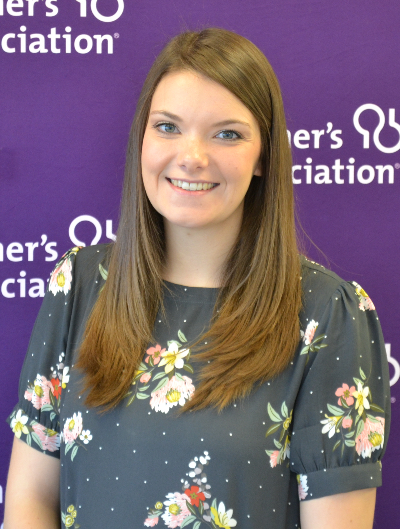Fighting Alzheimer’s at the Community Level
Story text Heading link

Kate Bobbitt transferred to the BA in Public Health program at the University of Illinois at Chicago (UIC) School of Public Health from a local community college, and one of the last community college classes she took focused on gerontology. That course was where Bobbitt first learned of Alzheimer’s disease.
“At the time, I was young, I was figuring out who I wanted to be, what impact I wanted to have on the world, and I hated the fact that one day a disease like Alzheimer’s could take that all away from me, and not just me but my sister, my mom, my dad, my friends,” Bobbitt said. “It ignited the fire in me to advocate for the rights of those living with the disease and the older adult population affected by it.”
As a 2015 graduate of the BA in Public Health program, Bobbitt now works as an advocacy manager at the Alzheimer’s Association Illinois Chapter, where she manages volunteer advocates coordinating with elected officials to advance legislative priorities related to Alzheimer’s.
The BOLD Infrastructure for Alzheimer’s Act (Building Our Largest Dementia Infrastructure) was one of the legislative accomplishments to the credit of advocacy managers like Bobbitt. Signed into law on December 31, 2018, the bill bolstered public health infrastructure through the establishment of regional centers to address Alzheimer’s and dementia and created funding for local health departments to specifically address the diseases and support caregivers.
Bobbitt says the bill has positioned Alzheimer’s as a public health crisis as opposed to solely an issue in the field of aging.
“While many of the struggles faced with Alzheimer’s are common across the board, this is not a broad issue,” Bobbitt said. “It’s very much an individualized issue, a community issue that can only be tackled on the community level.”
Bobbitt credits the community health focus in the BA in Public Health program with providing a lens for her advocacy work. She says the cohort model in the program generated strong conversation with classmates from different perspectives and different backgrounds. Those experiences built a mindset that public health fieldwork requires considering perspectives of people across communities.
Selected Quote Heading link
We’re working on these big federal policies, but we’re coming back down to the community level. We can’t get rid of this disease epidemiologically until we focus on our own communities, address those living with the disease and make sense for them.
| BA in Public Health '15
Story text, continued Heading link
As a student who was “that person in college doing every presentation about Alzheimer’s as a public health crisis,” it will come as no surprise that Bobbitt’s dream was to work at the Alzheimer’s Association, and that is where she aims to be as her career progresses.
“I think back to how much more relevant, how much more qualified for these positions I am,” Bobbitt said. “I never realized how much what I learned in the public health program would apply to what I’m doing today.”